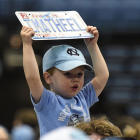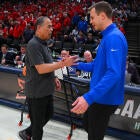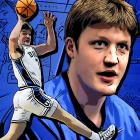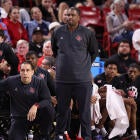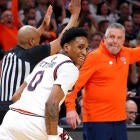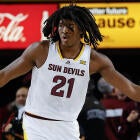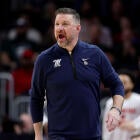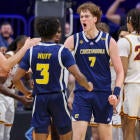The NCAA's Committee on Infractions announced Friday morning that the University of North Carolina will not be punished for any academic misconduct.
This means a story more than seven years in the making, and an investigation with three separate elongated stages, and untold amounts of dollars and billable legal hours put toward it, completes with no sanctions. No sanctions or probation or punishments for a school that had internal and independent reports verify hundreds of students -- many of them athletes -- benefitting from hundreds of phony courses dating back to 1997.
"A Division I Committee on Infractions hearing panel could not conclude that the University of North Carolina violated NCAA academic rules when it made available deficient Department of African and Afro-American Studies 'paper courses' to the general student body, including student-athletes," the NCAA's release states.
The critical point, as far as the NCAA is concerned, is that the general student body at North Carolina was benefitting from courses in African and Afro-American Studies that required little attendance and almost no work. UNC student-athletes took those courses in droves over the years, but the NCAA ultimately stuck to its guidelines and viewed the system academic misconduct as a university issue. It ultimately decided it could not stick this case, from an NCAA standpoint, to North Carolina's athletic department.
Since it's a university issue, and was not explicitly tied to boosting student-athletes' grades (including basketball and football players), the NCAA did not seek to overstep its jurisdiction. This judgement by the COI came under the umbrella of the the NCAA's enforcement staff -- which is a separate body within the NCAA, tasked with levying charges but not handing out punishment -- establishing the case as an "extra benefits" violation.
The enforcement staff alleged five Level I violations, including lack of institutional control and failure to monitor. But those findings could not translate to university discipline from the COI. Greg Sankey, the COI chief hearing officer and commissioner of the Southeastern Conference, in effect argued on Friday's call with the media that the enforcement staff and the Committee on Infractions act as separate, independent bodies for this very purpose. Not every case will see the enforcement staff's charges correlate with matching punitive action.
"The panel also did not conclude, based on the record before it, that extra benefits were provided to student-athletes," according to the NCAA. "The panel noted the former secretary credibly explained during the hearing that she treated all students the same."
That former secretary is Deborah Crowder, who for years declined to speak with the NCAA -- until this past May, according to Sankey, who revealed that during a Friday teleconference with the media. Crowder also attended the Committee on Infractions' hearing in Nashville in September.
"Based on both the information available in the record and North Carolina's support of the courses that were offered as not violating its policies, the panel could not conclude that the university failed to monitor or lacked control over its athletics program," the NCAA's press release states.
University of North Carolina Chancellor Carol Folt said this "isn't a time of celebration," but was pleased with the NCAA's ruling.
"I appreciated the real scrutiny that the NCAA put forward, but this is what I expected to be the outcome," Folt said.
The Committee on Infractions drew from nearly two decades worth of information that was supplied for the record in this case.
Furthermore, the COI report offers up this critical passage:
"The record, however, does not establish specific, intentional or systemic efforts tied to athletics motives. The record was full of email chains, missing academic work and interviews conducted, in some circumstances, more than five years after the classes ceased. Those materials, required the panel to, at best, infer motives based on the large number of student-athletes who took the courses and received high marks."
Yet, as Sankey admitted, it was "more likely than not" that UNC had student-athletes use African and Afro-American Studies courses to help their eligibility. Student-athletes who did that have reportedly, and in the case of former UNC star Rashad McCants admittedly, been a part of title-winning teams.
"I think it's important to understand the panel is in no way supporting what happened," Sankey saiid.
The NCAA was caught in a case that had opposing forces at work: Systemic, consistent cheating from an academic standpoint, and cheating that helped some student-athletes enhance their GPA -- but not strictly within the confines of the athletic department or any athletic staff (specifically with men's basketball) being involved. The COI had to rely on North Carolina's word about whether academic misconduct had truly taken place -- a stance the university vacillated on (from admitting it did to arguing it didn't) over the past three years.
"While student-athletes likely benefited from the so-called 'paper courses' offered by North Carolina, the information available in the record did not establish that the courses were solely created, offered and maintained as an orchestrated effort to benefit student-athletes," Sankey said via press release. "The panel is troubled by the university's shifting positions about whether academic fraud occurred on its campus and the credibility of the Cadwalader report, which it distanced itself from after initially supporting the findings. However, NCAA policy is clear. The NCAA defers to its member schools to determine whether academic fraud occurred and, ultimately, the panel is bound to making decisions within the rules set by the membership."
A possible critical help to North Carolina in this case was the fact that former department chairman, Julius Nyang'oro -- the professor at the center of the controversy, who officially retired in July 2012 -- did not cooperate with the NCAA's investigation. Without subpoena power, and with no career in collegiate athletics, Nyang'oro was under no obligation to help the NCAA. He was given a five-year show-cause penalty, which is effectively a meaningless punishment as Nyang'oro is retired and not an athletic employee.
"While student-athletes likely benefited from the courses, so did the general student body," Sankey said. "Additionally, the record did not establish that the university created and offered the courses as part of a systemic effort to benefit only student-athletes."
Sankey also said that although there wasn't overall failure to monitor and lack of institutional control violation -- as was charged in this case by the enforcement unit -- it was a big point of contention and deliberation amongst the committee. The only violations the COI levied were two failure-to-cooperate charges to those not even connected to athletics. Nyang'oro is the only one facing punishment, and even then it's a non-punishment in a practical sense.
This ruling by the COI comes as the committee's final judgement in an unprecedented case. The NCAA's enforcement unit first began investigating academic impropriety at North Carolina as far back as June 2010. This ruling is the COI's final decision in the third formal investigative stage; there were three Notice of Allegations tied to this issue, something unlike anything ever seen in Division I college basketball. This portion of the case took 3 1/2 years to complete.
All of North Carolina's championship banners will continue to hang from the rafters at the Dean Dome. And its most recent one, representing the 2017 national title, will be raised on Friday night at UNC's version of Midnight Madness.
Get the latest on this developing story from insiders on the ground at Chapel Hill. They've been covering Carolina athletics for two decades and will have all of the fallout, including recruiting impact and what's coming next. Visit InsideCarolina.com right now.
![[object Object] Logo](https://sportshub.cbsistatic.com/i/2020/04/22/e9ceb731-8b3f-4c60-98fe-090ab66a2997/screen-shot-2020-04-22-at-11-04-56-am.png)








